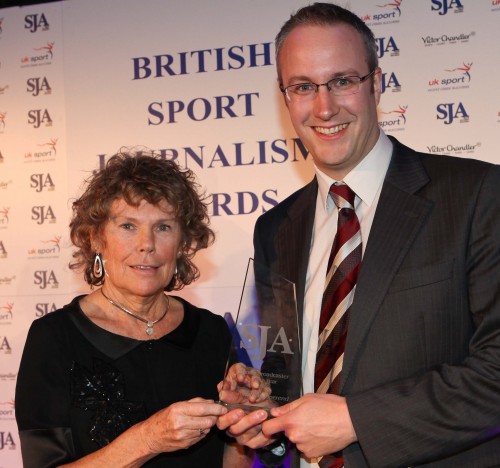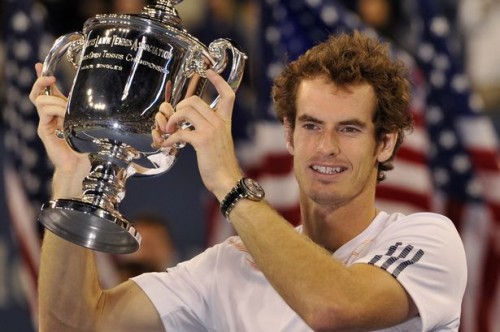BBC Radio’s JONATHAN OVEREND, the SJA’s sports broadcaster of 2010, on how he and his colleagues enjoy the best job in the world
Everyone says I have the best job in in the world. Having lived and worked through 2012, the sporting year of all years, I can now officially confirm they are right.

Never again will I grumble about legroom in commentary boxes, state of the half-time pies or BBC expenses (OK, I may be pushing things…). Last year, 2012, was the year to appreciate more than ever before the privilege of the badge, the unrestricted view, the magic microphone with the golden rings.
Our job was to live it to the full, immersed in the drama from Chicago to Stratford, New York to Manchester, and as the stories flowed like a mountain spring, 2012 was without a shadow of a doubt the year to have the world’s best job; the sports commentator.
Something was in the air back in May – and certainly on the air – as Sky’s Martin Tyler plus the BBC’s Guy Mowbray and Mike Ingham, a few seats from each other, roared with the rest of us at Sergio Aguero’s injury-time, Premier League title-winning goal at The Etihad.
That’s the thing about our job; as commentators you can prepare as much as you like with historical facts, clever phrases and the ubiquitous (if not always relevant) stream of statistics, but often the thing that really matters – the last-minute winner, the sprint to the line, the moment of major triumph – takes you and everyone else completely by surprise.
At that moment, any pre-conceived notion of the commentary, the mood or the historical importance simply serves to ruin the spontaneity. I don’t remember much of Andy Murray’s moment of victory in New York, it’s still all a bit of a dream-like haze, but I do remember saying, battling an emotional tear, I must confess: “Can’t believe he’s done it, just can’t… But he has!”
It’s hardly one of the great lines of commentary but, listening to the radio under their pillow at 2am that Tuesday morning, perhaps it reflected what a few million people were thinking. I’d like to think so.
At BBC Radio 5 Live, I am honoured to work with a group of exceptional broadcasters. Not just people such as Mike Costello and Simon Brotherton, whose emotion-packed voices called Farah, Ennis, Hoy and Wiggins home, but also people like John Hunt, Alistair Bruce-Ball and Rob Nothman, who effortlessly dealt with unique challenges during the Olympics to take sports broadcasting, certainly on the radio, to a whole new level.
John, whose surging commentaries of Frankel galloping into the history books redefined excellence in racing broadcasting last year, was tasked with the Olympic equestrian events in Greenwich Park. Alistair, one of our most under-rated football men, had to do a crash course in canoe slalom. And as for Rob, a BBC lifer as producer, reporter, trainer and bag carrier, well… “how do you feel about shooting commentary on the radio, Rob?”
As soon as Peter Wilson moved into gold medal position down at Bisley, Rob was firmly in charge of the microphone, a few yards from the shots. But Alistair had news from Lee Valley; gold was looking good there too. The beauty of radio. Back to Rob… another target hit. Back to Alistair… five gates to go. How’s everything at the dressage, John? No time to lose. Back to Alistair… “They’ve done it! it’s gold for Britain! And now over to Rob Nothman!!”… “And Peter Wilson shoots, and it’s another gold!”

From then on it was John at Greenwich, with his dancing horses and me at the taekwondo watching young women kick each other in the head. Not Aguero or Murray and their millions, but a more thrilling day of sports broadcasting I have never been involved in.
It just kept on coming. The Olympic coverage from BBC TV was faultless and staggeringly comprehensive, the Test Match Special team were in colourful form during the summer, and four days of Ryder Cup drama at Medinah were conveyed expertly by both Sky and 5 Live.
And before that we had the Paralympics, a truly significant moment in global coverage of disability sport thanks to the passion and professionalism of the teams at Channel 4 and 5 Live.
As David Weir came home for his third of four gold medals, I found myself in a soulless radio room at Flushing Meadows, watching some important match or other. I scanned the 436 American TV channels and found nothing of the Paralympics. Only a couple of hours of highlights after the event, we were told. Shameful. But with Mike Costello and the Olympic Stadium Chorus in my ears, nothing else seemed to matter as Weir crossed the line. It sounded like the biggest roar of the summer.
Thanks to the UK’s comprehensive sports media coverage, fronted by so many passionate and knowledgable broadcasters including the terrifyingly talented trio of Clare Balding, Jake Humphrey and Dan Walker, 2012 was truly unforgettable.
After a tragic few weeks, when we have said goodbye to respected and loved colleagues Christopher Martin-Jenkins and David Oates, we appreciate, more than ever, how lucky we are. May Chris and David live forever in the BBC archives and in the hearts of those who knew and listened to them.
- 2012 SJA BROADCAST AWARDS – voting is open until February 22, 2013. Voting is for paid-up SJA members only. Voting is only online – click here to go to the voting form now
- Tickets for the SJA British Sports Journalism Awards dinner on March 25 can be booked by clicking here